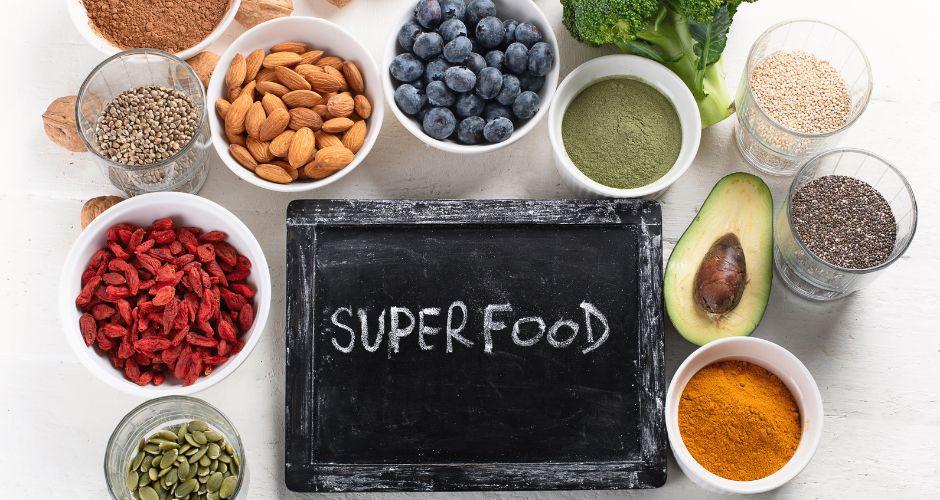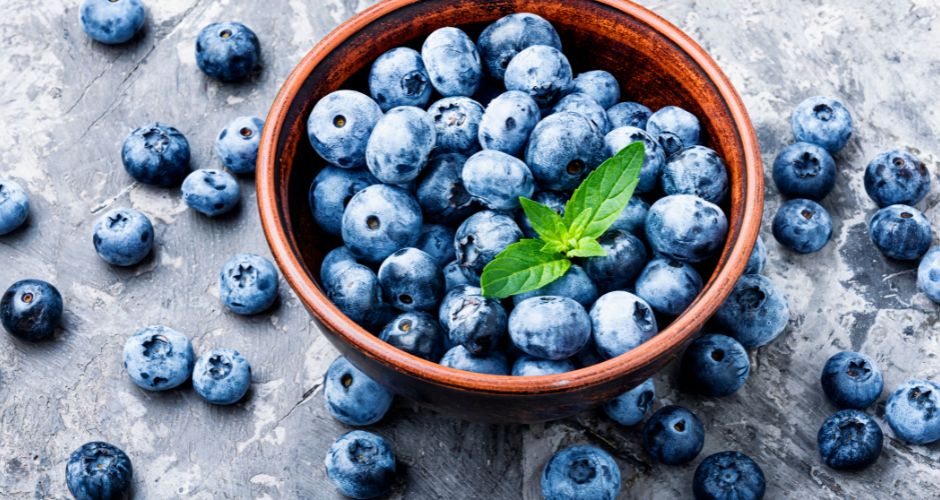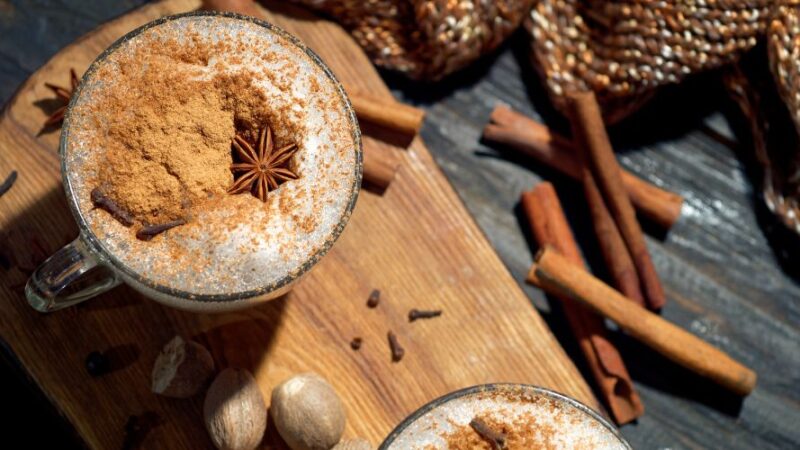9 Winter Superfoods to Reduce Memory Loss Symptoms

As winter envelops us in its chilly embrace, the desire to nurture not just our bodies but also our minds becomes paramount. The season, often synonymous with comfort foods and hearty indulgences, offers a unique opportunity to make mindful choices that can significantly impact our cognitive health.
In this exploration of 9 Winter Superfoods to Reduce Memory Loss Symptoms, we embark on a journey through the realm of winter superfoods, discovering how these nutrient-packed treasures can be powerful allies in the fight against memory loss symptoms.
Blueberries
Blueberries emerge as tiny but mighty champions, specifically geared towards reducing memory loss symptoms.
1. Antioxidant-Rich Marvels: Blueberries boast a remarkable concentration of antioxidants, particularly anthocyanins. These compounds, responsible for the berry’s deep blue hue, play a pivotal role in neutralizing free radicals that can cause oxidative stress in the brain. By combating oxidative stress, blueberries contribute to a healthier environment for cognitive function.
2. Improved Blood Flow to the Brain: Studies have indicated that the antioxidants in blueberries may enhance blood flow to the brain. This increased circulation ensures that vital nutrients and oxygen reach brain cells efficiently, promoting optimal functioning. Improved blood flow is closely associated with better cognitive performance, making blueberries a delicious ally in the quest for a sharper mind.

3. Memory Enhancement: The positive impact of blueberries on memory is a compelling reason to include them in your winter diet. Research suggests that regular consumption of blueberries may lead to improvements in memory retention and cognitive function. Whether you’re navigating work tasks or simply aiming to remember the details of a winter adventure, blueberries could be your secret weapon for mental acuity.
4. Versatile Culinary Delights: Beyond their health benefits, blueberries are a versatile addition to your winter culinary repertoire. Sprinkle them over morning oatmeal, blend them into smoothies, or enjoy them as a snack on their own. The adaptability of blueberries makes it easy to incorporate these brain-boosting gems into various meals, adding a burst of flavor and nutrition.
5. Convenient and Accessible: One of the perks of including blueberries in your winter superfood lineup is their accessibility. Whether fresh or frozen, blueberries are widely available throughout the year. This convenience ensures that you can harness their nutritional benefits even in the heart of winter, maintaining a consistent intake for lasting cognitive support.
6. A Delicious Approach to Brain Health: The journey to reduce memory loss symptoms doesn’t have to be bland or uninspiring. Blueberries offer a sweet and delightful way to prioritize your brain health. Swap out sugary snacks for a handful of blueberries, and you’ll not only satisfy your sweet cravings but also contribute to the well-being of your most vital organ.
Salmon
Salmon stands out as a nutritional powerhouse that not only graces our plates with its delectable taste but also provides essential nutrients crucial for cognitive well-being.
1. Omega-3 Fatty Acids: Salmon is renowned for its rich content of omega-3 fatty acids, particularly docosahexaenoic acid (DHA). These fatty acids are essential for the structure and function of brain cells. DHA, in particular, is abundantly present in the brain and plays a vital role in cognitive function, making salmon a key player in promoting memory support.
2. Building and Repairing Brain Cells: Omega-3 fatty acids found in salmon contribute to the formation and maintenance of cell membranes in the brain. This process is crucial for neuronal communication and the overall structural integrity of the brain. Regular consumption of salmon provides the necessary building blocks for the continuous renewal and repair of brain cells.

3. Guarding Against Cognitive Decline: Numerous studies have suggested that omega-3 fatty acids, such as those found in salmon, may offer protection against age-related cognitive decline. Including salmon in your winter diet becomes a proactive measure in promoting cognitive longevity and reducing the risk of memory-related issues as you age.
4. Enhancing Memory and Learning: The cognitive benefits of salmon extend to memory enhancement and improved learning. DHA, in particular, has been associated with better memory performance. Whether you’re tackling work projects or seeking to absorb the details of winter festivities, the nutrients in salmon could be your ally in sharpening cognitive function.
Broccoli
Broccoli emerges as a verdant powerhouse, offering both culinary versatility and a rich array of nutrients beneficial for cognitive well-being. Eexplore how incorporating this cruciferous vegetable into your winter diet can contribute to maintaining a sharp and resilient memory.
1. Vitamin K: Broccoli is a potent source of vitamin K, a nutrient that plays a crucial role in brain health. Vitamin K is involved in the synthesis of sphingolipids, a class of lipids densely concentrated in brain cell membranes. By supporting the structural integrity of brain cells, broccoli provides a foundation for optimal cognitive function.
2. Antioxidants for Neuroprotection: Rich in antioxidants, including vitamin C and various phytonutrients, broccoli actively participates in neuroprotection. Antioxidants combat oxidative stress, reducing the damage caused by free radicals in the brain. This protective mechanism contributes to maintaining the health of brain cells and, consequently, memory function.

3. Folate for Cognitive Support: Broccoli is a good source of folate, a B-vitamin known for its cognitive support. Folate is involved in the production of neurotransmitters, the chemical messengers that facilitate communication between brain cells. Including broccoli in your winter meals provides a natural means of promoting a neurotransmitter-rich environment.
4. Anti-Inflammatory Properties: Chronic inflammation is linked to various cognitive issues, including memory loss. Broccoli contains anti-inflammatory compounds, such as sulforaphane, which may help mitigate inflammation in the brain. This anti-inflammatory action contributes to creating an environment conducive to optimal cognitive function.
5. Versatility in Culinary Delights: One of the appealing aspects of broccoli is its versatility in the kitchen. Whether steamed, roasted, sautéed, or incorporated into soups and stews, broccoli easily adapts to various culinary preparations. This versatility allows you to enjoy its memory-boosting benefits in diverse and delicious winter dishes.
6. Nutrient-Rich Addition to Winter Meals: Beyond its cognitive benefits, broccoli is a nutrient-dense addition to winter meals. It provides essential vitamins, minerals, and fiber, contributing to overall health and well-being. As a low-calorie and nutrient-packed vegetable, broccoli becomes a valuable component of a balanced and brain-healthy diet.
Pumpkin Seeds
As winter wraps its cool embrace around us, the quest for foods that not only satisfy our taste buds but also fortify our cognitive health becomes paramount.
1. Magnesium-Rich Memory Boosters: Pumpkin seeds are a remarkable source of magnesium, a mineral vital for various physiological functions, including cognitive health. Magnesium has been linked to improved learning and memory, making pumpkin seeds an invaluable addition to your winter snacking repertoire.
2. Neurotransmitter Support: Magnesium plays a crucial role in the release and function of neurotransmitters, the chemical messengers that facilitate communication between brain cells. By ensuring optimal neurotransmitter activity, pumpkin seeds contribute to a balanced and responsive brain, potentially reducing the risk of memory-related issues.

4. Zinc for Cognitive Function: Zinc, another essential mineral found in pumpkin seeds, plays a role in maintaining cognitive function. Adequate zinc levels are associated with improved memory and cognitive performance. Including pumpkin seeds in your winter diet ensures a natural and delicious way to support your brain’s zinc requirements.
5. Convenient and Tasty Snacking: One of the standout features of pumpkin seeds is their convenience as a snack. Whether enjoyed on their own or added to trail mixes, salads, or yogurt, pumpkin seeds provide a satisfying and crunchy snack option. Their portability makes them an ideal choice for on-the-go memory support during the winter months.
6. Fiber-Rich Brain Fuel: In addition to their mineral content, pumpkin seeds are rich in dietary fiber. Fiber promotes stable blood sugar levels, preventing energy crashes that can affect cognitive function. The sustained energy from fiber makes pumpkin seeds an excellent brain fuel for enduring winter activities.
7. Immune Support for Winter Wellness: Pumpkin seeds contain compounds that support immune function, a crucial aspect of overall health during the winter season. A healthy immune system indirectly contributes to cognitive well-being by ensuring the body’s overall vitality.
Dark Chocolate
Beyond its luscious taste, dark chocolate unveils a treasure trove of compounds that can actively contribute to reducing memory loss symptoms.
1. Flavonoids for Improved Blood Flow: Dark chocolate is rich in flavonoids, plant compounds with antioxidant properties. These flavonoids have been associated with improved blood flow, including enhanced circulation to the brain. The increased blood flow contributes to optimal oxygen and nutrient delivery, fostering an environment conducive to memory health.
2. Caffeine Boost for Alertness: Dark chocolate contains a moderate amount of caffeine, providing a gentle boost in alertness and cognitive function. This natural stimulant can enhance focus and concentration, making dark chocolate a delightful pick-me-up during the winter months when energy levels may need a gentle nudge.

3. Antioxidants Combating Oxidative Stress: Oxidative stress is a culprit in cognitive decline, and dark chocolate, with its abundance of antioxidants, acts as a formidable defender. These antioxidants neutralize free radicals, reducing the cellular damage that can contribute to memory loss. Indulging in dark chocolate becomes a tasteful way to support overall brain health.
4. Rich in Theobromine: Theobromine, a natural stimulant found in dark chocolate, has been linked to enhanced cognitive function. It promotes a gentle mental lift without the jitteriness associated with some other stimulants. Theobromine’s presence in dark chocolate adds to its allure as a winter treat with cognitive benefits.
5. Mood-Boosting Serotonin Release: Dark chocolate stimulates the release of serotonin, a neurotransmitter associated with mood regulation. Improved mood can positively impact cognitive function, creating an uplifting and enjoyable experience during the winter season.
6. Memory Enhancement and Learning: Studies suggest that the consumption of dark chocolate may have a positive impact on memory and learning. Regular indulgence in moderate amounts of dark chocolate can be seen as a pleasurable ritual that may contribute to better cognitive performance over time.
Turmeric
Turmeric emerges as a golden-hued ally with a rich history of offering both culinary delight and potent health benefits. Beyond its vibrant color and warm flavor, turmeric houses curcumin, a compound known for its anti-inflammatory and antioxidant properties.
1. Curcumin’s Anti-Inflammatory Powerhouse: The active compound in turmeric, curcumin, is a potent anti-inflammatory agent. Chronic inflammation is linked to various cognitive issues, including memory loss. By mitigating inflammation, turmeric provides a protective shield for the brain, creating an environment conducive to optimal cognitive function.
2. Antioxidant Benefits for Brain Health: Turmeric is rich in antioxidants that combat oxidative stress, a process implicated in the aging of the brain and cognitive decline. The antioxidant properties of turmeric contribute to the preservation of brain cells and support overall brain health, potentially reducing the risk of memory-related issues.

3. Potential Clearing of Amyloid Plaques: Studies suggest that curcumin may have the ability to cross the blood-brain barrier and clear away amyloid plaques, which are associated with Alzheimer’s disease. While more research is needed, the preliminary findings point to turmeric’s potential role in promoting cognitive health.
4. Neurogenesis and Cognitive Resilience: Curcumin has been linked to the promotion of neurogenesis – the growth and development of new neurons. This process is crucial for cognitive resilience and may contribute to maintaining memory function, especially in the face of age-related changes in the brain.
5. Mood Enhancement with Serotonin and Dopamine: Beyond its impact on cognitive function, turmeric has been associated with mood enhancement. Curcumin may influence the levels of serotonin and dopamine, neurotransmitters that play a key role in regulating mood. A positive mood can indirectly contribute to cognitive well-being during the winter season.
Oranges
Beyond their sweet and tangy flavor, oranges are laden with essential nutrients that contribute to overall well-being, including cognitive health.
1. Vitamin C: Oranges are renowned for their high vitamin C content, making them a potent antioxidant source. Vitamin C plays a crucial role in neutralizing free radicals that can lead to oxidative stress in the brain. By acting as an antioxidant shield, oranges contribute to maintaining the health of brain cells, supporting memory function in the process.
2. Brain Blood Flow Boost: The flavonoids present in oranges have been associated with improved blood flow to the brain. Enhanced blood circulation ensures that the brain receives an adequate supply of oxygen and nutrients, creating an environment conducive to optimal cognitive function and potentially reducing the risk of memory-related issues.

3. Collagen Synthesis for Neuroprotection: Vitamin C is essential for collagen synthesis, a process vital for maintaining the structural integrity of blood vessels, including those in the brain. Ensuring the health of blood vessels supports overall neuroprotection and contributes to a resilient cognitive framework.
4. Neurotransmitter Production: Oranges contribute to the synthesis of neurotransmitters, the chemical messengers that facilitate communication between brain cells. Vitamin C, in particular, plays a role in the production of neurotransmitters like serotonin and dopamine, influencing mood and indirectly supporting cognitive well-being.
5. Fiber for Stable Blood Sugar: The fiber content in oranges aids in maintaining stable blood sugar levels. Stable blood sugar is crucial for sustained energy, preventing the fluctuations that can impact cognitive function. Consistent energy levels support optimal brain performance during winter activities.
Spinach
Spinach emerges as a verdant superfood, offering a multitude of health benefits, including support for cognitive function.
1. Nutrient-Rich Profile: Spinach boasts a nutrient-rich profile, including folate, vitamin E, and vitamin K, making it a nutritional powerhouse for cognitive health. These essential nutrients play integral roles in neurotransmitter synthesis, antioxidant defense, and brain cell maintenance.
2. Folate for Neurotransmitters: Folate, a B-vitamin abundant in spinach, is crucial for the production of neurotransmitters like serotonin, dopamine, and norepinephrine. These neurotransmitters are vital for mood regulation and cognitive function, making spinach a valuable ally for mental well-being.

3. Vitamin E: Antioxidant Shield: Vitamin E, present in spinach, acts as a potent antioxidant, shielding the brain from oxidative stress. This protective action contributes to the preservation of cognitive function and reduces the risk of memory-related issues as you navigate the winter months.
4. Vitamin K for Brain Health: Spinach is rich in vitamin K, a nutrient associated with brain health. Vitamin K is involved in the synthesis of sphingolipids, a class of lipids densely concentrated in brain cell membranes. By supporting membrane integrity, spinach aids in maintaining optimal cognitive function.
5. Diverse Nutrient Synergy: The combination of folate, vitamin E, and vitamin K, along with other micronutrients in spinach, creates a synergistic effect. This nutrient synergy contributes to a holistic approach to cognitive support, providing a diverse array of compounds that benefit brain health.
Walnuts
In the winter’s embrace, as nature slows down and we seek comfort and sustenance, walnuts emerge as a small but mighty winter superfood, offering not only a delightful crunch but also a rich array of nutrients essential for cognitive health.
1. Omega-3 Fatty Acids: Walnuts are a stellar source of omega-3 fatty acids, particularly alpha-linolenic acid (ALA). These essential fatty acids play a crucial role in supporting brain structure and function, contributing to improved cognitive performance and potentially reducing the risk of memory-related issues.
2. Antioxidant Powerhouse: Walnuts pack a punch in terms of antioxidants, including vitamin E and polyphenols. These antioxidants combat oxidative stress in the brain, protecting neurons from damage and contributing to overall cognitive health. The walnut’s antioxidant prowess makes it a valuable ally in the fight against memory loss.

3. Neuroprotective Benefits: The combination of omega-3 fatty acids and antioxidants in walnuts offers neuroprotective benefits. These compounds help shield the brain from age-related damage, potentially reducing the risk of cognitive decline. Including walnuts in your winter diet becomes a tasty strategy for nurturing your brain’s long-term health.
4. Improved Cognitive Function: Studies suggest that regular consumption of walnuts may be associated with improved cognitive function. The nutrients in walnuts, along with their potential to enhance blood flow to the brain, contribute to better memory, attention, and problem-solving skills.
5. Convenient and Portable Snack: Walnuts stand out as a convenient and portable snack option, making them an ideal choice for on-the-go cognitive support during winter activities. A handful of walnuts can provide a satisfying and nutrient-rich boost, whether you’re heading out for a winter stroll or settling in for a cozy evening.
As you navigate the winter season, consider these 9 Winter Superfoods to Reduce Memory Loss Symptoms as powerful allies in your quest for optimal cognitive health. Whether incorporated into meals or enjoyed as snacks, these nutrient-dense foods offer a tasty and effective way to reduce memory loss symptoms.
Remember, small changes in your diet can lead to significant improvements in your overall well-being, so embrace the winter with a nourished mind and a fortified memory.






One thought on “9 Winter Superfoods to Reduce Memory Loss Symptoms”